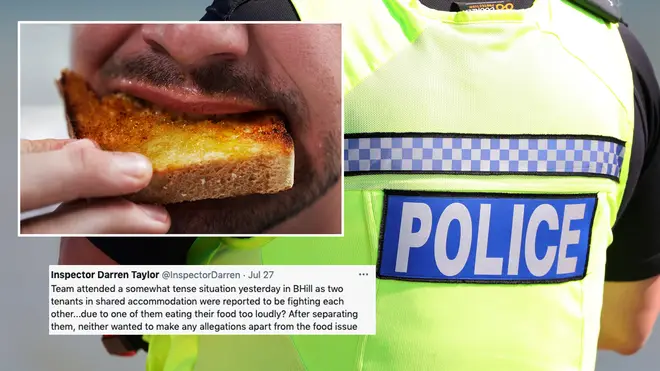Police called after fight broke out over housemate 'chewing food too loudly'
29 July 2021, 10:57 | Updated: 29 July 2021, 11:15

Two housemates got into a fight over someone 'chewing food too loudly'.
Let’s face it, when it comes to irritating habits, loud chewers are up there.
But while most of us can handle the odd crunchy carrot, one tenant was left fuming when their housemate began eating a little too noisily.
In fact, the police even had to be called after the two roommates living in Burgess Hill, West Sussex got into an almighty fight.
- Ashton Kutcher and Mila Kunis reveal they only bathe their children when they 'can see dirt on them'
- How to keep busy at home with the kids when you're self-isolating
- Mum discovers genius school trouser hack that means kids won't grow out of them all year

Things got so tense that officers had to break up the argument on Monday, with Inspector Darren Taylor calling it a ‘somewhat tense situation’.
Taking to Twitter, he wrote: “Team attended a somewhat tense situation yesterday in BHill as two tenants in shared accommodation were reported to be fighting each other...due to one of them eating their food too loudly?
“After separating them, neither wanted to make any allegations apart from the food issue.”
One social media responded that the tenant might have ‘misophonia’, which is the medical term for someone who finds certain sounds too horrible to bare.
Team attended a somewhat tense situation yesterday in BHill as two tenants in shared accommodation were reported to be fighting each other...due to one of them eating their food too loudly? After separating them, neither wanted to make any allegations apart from the food issue pic.twitter.com/ZHbJ5RHZgA
— Inspector Darren Taylor (@InspectorDarren) July 27, 2021
Also called ‘hyperacusis’, the NHS website states: “You may have hyperacusis if some everyday sounds seem much louder than they should. It can sometimes be painful.”
As well as chewing, those who suffer from this may be affected by sounds like jingling coins, barking dogs, car engines and vacuum cleaners.
According to the British Tinnitus Association, there are a few medical conditions that have hyperacusis as a symptom.
These include migraines, post head injury syndrome, Lyme disease, William’s syndrome and Bell’s palsy.
Exposure to sudden loud noise can also sometimes trigger hyperacusis.
It can be treated with sound therapy to get the sufferer used to everyday noises again, and may involve wearing ear pieces that make white noise
Cognitive behavioural therapy (CBT) can also be used to reduce anxiety.






























